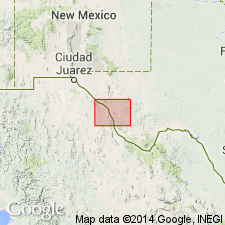
- Usage in publication:
-
- Duff Tuff
- Modifications:
-
- Areal extent
- AAPG geologic province:
-
- Permian basin
Summary:
Duff Tuff mapped as a formation in Buck Hill Group in the southeastern part of the mapped area, Presidio Co, west TX in Permian basin. Is chiefly rhyolitic tuff with minor breccia and conglomerate; tuff is fine grained, well indurated, massive, mostly white, light shades of red and yellow common; conglomerate in lenticular beds as much as 40 ft thick, cross-bedded, dark brown. Thickness is as much as 1,400 ft. Contains Oligocene vertebrate fossils. Duff is mapped together with Pruett Formation in the Cuesta del Burro area, where the undivided unit consists of rhyolitic tuff and intercalated tuffaceous clay, silt, sandstone, and conglomerate, moderate to well indurated, white, gray, red, and yellow. Thickness of Duff Tuff and Pruett Formation (undivided) of Buck Hill is as much as 1,500 ft. Shown on Correlation of Map Units as below Mitchell Mesa Welded Tuff of Buck Hill Group. [Author states that correlation of volcanic rocks from area to area on Marfa sheet is uncertain--little attempt is made to correlate between areas. The rocks are described by area.] Is of Oligocene age. Geologic map.
Source: GNU records (USGS DDS-6; Denver GNULEX).
For more information, please contact Nancy Stamm, Geologic Names Committee Secretary.
Asterisk (*) indicates published by U.S. Geological Survey authors.
"No current usage" (†) implies that a name has been abandoned or has fallen into disuse. Former usage and, if known, replacement name given in parentheses ( ).
Slash (/) indicates name conflicts with nomenclatural guidelines (CSN, 1933; ACSN, 1961, 1970; NACSN, 1983, 2005, 2021). May be explained within brackets ([ ]).

